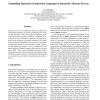11 search results - page 1 / 3 » A Formal Semantics of Clock Refinement in Imperative Synchro... |
ACSD
2010
IEEE
13 years 2 months ago
2010
IEEE
The synchronous model of computation divides the execution of a program into an infinite sequence of socalled macro steps, which are further divided into finitely many micro steps....
MEMOCODE
2010
IEEE
13 years 2 months ago
2010
IEEE
To overcome over-synchronization in synchronous programs, we recently introduced clock refinement to our synchronous programming language Quartz. This extension basically allows p...
ACSD
2001
IEEE
13 years 8 months ago
2001
IEEE
We present a new way to define the semantics of imperative synchronous languages by means of separating the control and the data flow. The control flow is defined by predicates th...
ISORC
2009
IEEE
13 years 11 months ago
2009
IEEE
The UML goal of being a general-purpose modeling language discards the possibility to adopt too precise and strict a semantics. Users are to refine or define the semantics in th...
EMSOFT
2004
Springer
13 years 10 months ago
2004
Springer
The paper introduces a higher-order synchronous data-flow language in which communication channels may themselves transport programs. This provides a mean to dynamically reconfi...

